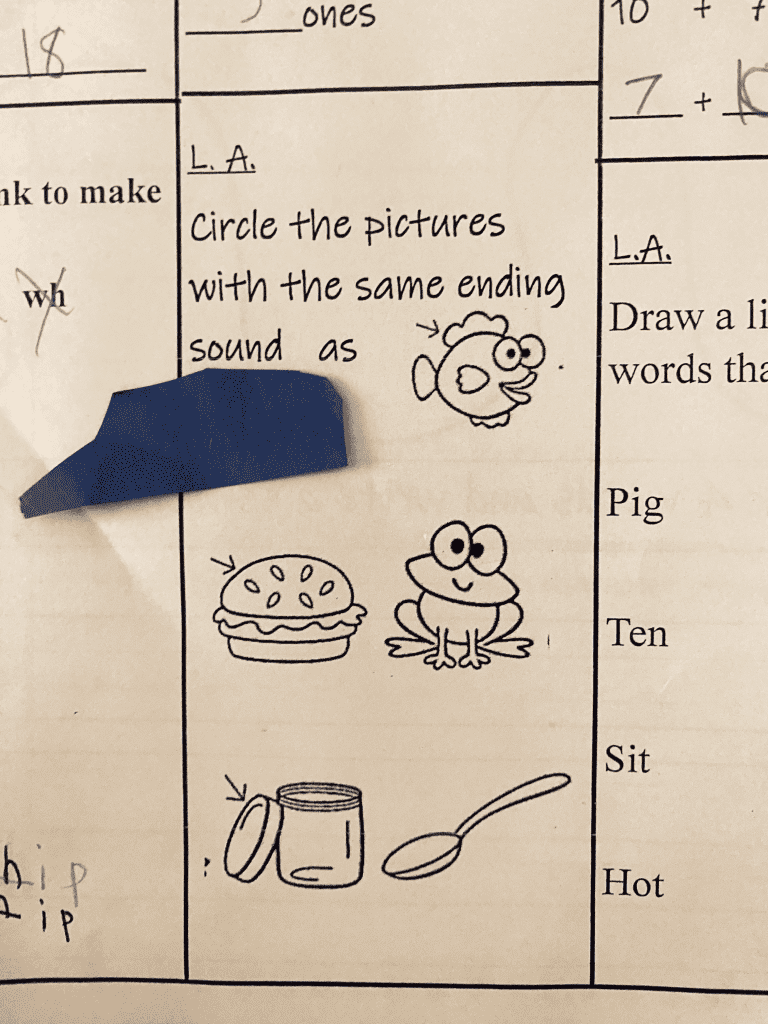As children progress through school, their homework assignments often grow in complexity, sometimes to the point where even the most well-educated adults find themselves stumped. This can be especially true when parents attempt to help their kids with what seems like a straightforward question, only to find that the solution is anything but simple. In today’s digital age, many parents turn to online communities like Reddit and Twitter to seek assistance. Here are seven real-life examples of kids’ homework questions that left adults puzzled and reaching out for help.
The First-Grade English Conundrum: When Sounds Don’t Seem to Match

One of the most baffling homework assignments came from a first-grade English class, where a young student was asked to identify pictures that shared the same ending sound as the word “fin.” The options provided were a hamburger bun, a frog, a jar lid, and a spoon. This seemingly simple task left one mother scratching her head, unable to see a clear pattern.
After sharing the question on Reddit, the online community jumped in with suggestions. Some users pointed out that the ending sound didn’t necessarily have to rhyme with “fin” but could instead end with the same letter. Following this logic, the correct answers would be “bun” and “spoon,” as both words end with an “n” sound. While this might seem straightforward in hindsight, it highlights how language exercises can sometimes be more complex than they initially appear.
Kindergarten Word Games: Finding the Hidden Three-Letter Word
Son’s kindergarten school work. What 3-4 letter word is this??
byu/OllieSDdog inmildlyinfuriating
Another parent found themselves stumped by a kindergarten homework question that required a three-letter word to describe a picture of a rabbit with its bunnies. Despite the simplicity of the task, the answer eluded them, leading to a moment of frustration.
Fortunately, a helpful Reddit user offered the word “pet” as the solution, explaining that these types of worksheets often make the last question a bit trickier by altering the expected sound patterns. This clever twist is designed to challenge young minds, but it can easily trip up even the most attentive adults.
Grade 3 Math: When the Numbers Don’t Add Up
This 3rd grade math problem…
byu/L8asUsual infunny
Math problems are a staple of elementary school homework, but one particular Grade 3 question left both students and parents befuddled. The problem read, “Janell had 15 marbles. She lost some of them. How many does Janell have now?” Without more information, solving this question seems impossible.
Reddit users weighed in, with some suggesting that the answer must simply be “less than 15,” while others humorously proposed that the response should mirror the question: “Janell lost her marbles.” This example illustrates how vague math problems can lead to a wide range of interpretations, sometimes with hilarious results.
The Six-Year-Old’s Mystery Question: Apples and Paint Splatter
So confused at a 6 year old’s homework.
byu/FeelMyXerath inpics
A six-year-old’s homework question left both parents and Reddit users scratching their heads. The question involved a picture of a paint splatter and several apples, asking, “How many apples could be covered by the paint? There cannot be more than 20.” The question’s vague phrasing and abstract concept made it difficult for anyone to provide a definitive answer.
One Reddit user suggested that the question might be a riddle, designed to provoke creative thinking rather than elicit a straightforward answer. Regardless of the intent, this question demonstrates how even early education can sometimes challenge the understanding of both students and their parents.
Singaporean Math: The Grade 1 Problem That Stumped the Internet
Apparently, this math question appeared in an exam for Grade Ones in Singapore. Lets see who can solve it.
— mmatigari (@matigary) May 17, 2017
NdooSTEM ka Jonso @ProfJNMoyo 😅😅 pic.twitter.com/uhgQAzaHei
Singapore is known for its rigorous education system, and one Grade 1 math problem shared on Twitter proved just how challenging it can be. The problem, which seemed nearly impossible to solve, sparked a flurry of responses from around the world. Eventually, one user managed to crack the code but only after tweaking the question slightly to make it solvable.
This example shows how different educational systems approach problem-solving in unique ways, often leading to confusion when these methods are encountered outside their intended context.
The Perplexing Perimeter Problem: A Rectilinear Challenge
Can you solve this maths question which has left pupils and parents scratching their heads?https://t.co/jmt1pbInNH
— Manchester News MEN (@MENnewsdesk) June 7, 2016
Another math problem posted on Twitter left many users scratching their heads. The question involved calculating the perimeter of a shape based on the calculations of another rectilinear shape. The complexity of the problem, especially for a young student, led one person to sarcastically comment that it was “very much justified to ask these to a [ten-year-old].”
This highlights the fact that while math problems are designed to develop critical thinking skills, they can sometimes be too advanced for the intended age group, leading to frustration and confusion.
Solving for X: The Beethoven Symphony Puzzle
That's not how this works. That's not how any of this works. pic.twitter.com/EdSSJInqEp
— Doug Mataconis (@dmataconis) October 9, 2017
Math can sometimes be abstract, but one homework question took this to another level. The problem involved an orchestra of 120 players taking 40 minutes to play Beethoven’s 9th Symphony and asked how long it would take for 60 players to play the same piece. While math enthusiasts might enjoy the challenge, many found it overly complex for students.
One Twitter user pointed out that the number of musicians doesn’t actually affect the duration of the symphony, as the speed at which it’s played remains constant regardless of the number of performers. This answer underscores the importance of understanding context and content when solving math problems, rather than simply relying on numbers and formulas.
Conclusion: The Unexpected Complexity of Kids’ Homework
These examples highlight how even the simplest of homework questions can sometimes stump parents and lead to a broader conversation about the challenges of modern education. Whether it’s the ambiguity of language exercises or the abstract nature of math problems, helping kids with homework can be an unexpectedly complex task. The next time you find yourself puzzled by a homework question, remember—you’re not alone, and sometimes it takes a village, or at least an online community, to find the right answer.


